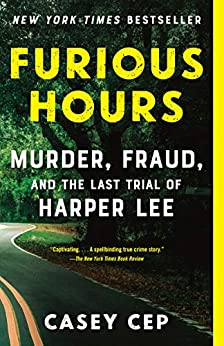More on this book
Community
Kindle Notes & Highlights
by
Casey Cep
Read between
August 4, 2021 - January 24, 2023
Tom swore he’d never worship anywhere that preached God’s judgment without God’s love.
For locals, it was where you went for pretty much everything short of salvation and groceries.
watching the bottom of men’s blazers to see if they flapped in the wind or stayed still, held down by the weight of a gun.
At one point during the service, a folding chair slid down from where it had been propped against a wall, clanging loudly against the ground and causing all the lawmen to reach for their guns. But no one was shot at the funeral of the man who was shot at a funeral.
It had become obvious to her that a writer is someone who writes, and also that sooner or later everyone disappoints their parents: better, she figured, to get started on both.
Like a lot of small-town bookworms, she was too well-read to be a true country bumpkin, but too country, even after Montgomery and Tuscaloosa, to be anything but mesmerized by Manhattan.
She had enough books to read—and movies to see, and museums to visit—to last her several lifetimes. The city overwhelmed and delighted her.
Like many self-exiled people, she was betwixt and between—wanting to write about Alabama when she was in New York, and wanting to be in New York whenever she was home in Alabama.
Her father, who had been as wise as Solomon when she was small, suddenly seemed as aged as Abraham.
“Sitting & listening to people you went to school with is excruciating for an hour—to hear the same conversation day in & day out is better than the Chinese torture method.”
Lee could let Atticus stand as a moral exemplar, the lawyer who defends an innocent black man from a racist mob. To his daughter, Atticus was a man ahead of his time, but in Go Set a Watchman it not only catches up but passes him by; in To Kill a Mockingbird, he stays heroic forever.
But Lee’s efforts to convey that complexity
had turned Watchman into a didactic stage play between “Enlightened Daughter” and “Benighted Father,” and the characters could not bear their political weight.
And she gave Capote the gift of notes on things that had nothing to do with the murders but everything to do with the place where they occurred—its cats, customs, charlatans, and seasons. More than most field notes, hers were a book waiting to be written.
Contrary to what most people think, there is no glamour to writing. In fact, it’s heartbreak most of the time.”
Lee tended Crain the way she had her father, trying to bar the door against death, hoping it wouldn’t find a way inside.
The New York that Harper Lee had known was changing, as it does for so many, one friend and one building at a time.
“More tears are shed over answered prayers than unanswered ones.”
“We are bound by a common anguish.”
“He might not have believed in what he preached, he might not have believed in voodoo,” she wrote of the Reverend, “but he had a profound and abiding belief in insurance.”
But she was still writing a Watchman that she did not yet know how to turn into a Mockingbird,
Lizzie Borden: “Anyone burdened with long petticoats and having had mutton soup for breakfast on a day like that was bound to have murdered somebody before sundown”).
Harper Lee came of age in one of the soggiest periods in American literature, when William Faulkner was claiming he couldn’t write without a glass of whiskey nearby and Ernest Hemingway, upping the ante, said he needed a quart of it every day and also liked dry
Nor could any one moment mark the time when, definitively, she no longer would. As Kierkegaard observed, we live forward but comprehend backward;
In a strange inversion, the closer to done a book is, the more unfinished, in this sense, it feels.
“Self-pity is a sin,” she told a reporter in 1963, already frustrated, only three years after Mockingbird. “It is a form of living suicide.”
“Books succeed, / And lives fail,”
“Fame was a four-letter word, and boredom was for rich and dull-witted Yankees.”
Whatever Claudia said that first day she “interviewed” Lee in Tuscaloosa, it must have been Alabamian for abracadabra, because the writer, who had turned down more than a
few would-be biographers, declared Claudia her Boswell. Virtually in the same breath, though, Lee all but doomed the project by making Claudia promise that she wouldn’t get started until all of the dust was settled—the dust, in this case, being the kind usually accompanied by ashes.
and her memory, by most accounts, could reach back in time but not hold on to the present.


